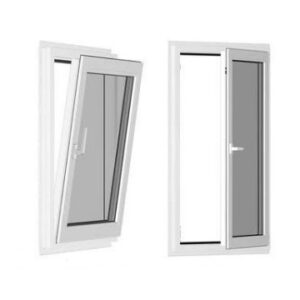
When it comes to choosing the right windows for your home, there are several options to consider, with tilt and turn windows, single hung/double hung windows, or casement windows being popular choices. Each type of window has its own set of advantages and things to consider. In this post, we’ll explore the differences between these window types to help you choose the right window that are best fit for your needs.
Tilt and Turn Windows

Tilt and turn windows are known for their versatility and practicality. They offer two distinct modes of operation: tilt and turn.
- When tilted open, the top of the window tilts inward, allowing for secure ventilation. This position is ideal for maintaining privacy while still letting fresh air into your space. Tilt and turn windows are especially valuable for homes with children or pets, as the inward tilt restricts access to the outdoors.
- When turned open, the window fully swings open, similar to a casement window. However, unlike the casement window, the window opens into the home like a door. This provides easy access for cleaning, maintenance, and emergency exits. This feature is particularly useful for upper-story windows that are otherwise challenging to reach.
One of the standout features of tilt and turn windows is their enhanced security. When locked in the tilt position, they provide a high level of protection against intruders. Additionally, the multiple locking points and tight seals contribute to their security.
Tilt and turn windows are also favored for their energy efficiency. The airtight seal and high-quality insulation properties make them excellent for minimizing heat loss in the winter and preventing heat gain in the summer. This can lead to energy cost savings over time.
Single Hung or Double Hung Windows

Single-hung and double-hung windows are popular in many home designs and a variety of home styles.
A single-hung window, also known as a single-sash window, is a type of window with a lower, operable sash and an upper, fixed sash. This means that the bottom part of the window slides up and down, while the top part remains stationary. Single-hung windows provide ventilation through the bottom sash.
A double-hung window, also commonly referred to as a double-sash window, is a type of window that has two operable sashes that slide up and down. There are two main operable parts of a double-hung window — the top sash and the bottom sash. They are both able to open to provide ventilation. Because heat rises, warm air is able to escape out of the top sash, while cool air from the outside is able to flow through the lower sash opening to help provide increased comfort. This makes them an excellent choice for two-story homes.
Casement Windows
 Casement windows are hinged at the side and fully open. However, unlike the tilt and turn windows, the window opens outside like a door. They provide unobstructed views and excellent natural ventilation when fully opened. Casement windows are also known for their aesthetic appeal. Their sleek, clean lines and unobstructed glass create a modern and timeless look that complements various architectural styles.
Casement windows are hinged at the side and fully open. However, unlike the tilt and turn windows, the window opens outside like a door. They provide unobstructed views and excellent natural ventilation when fully opened. Casement windows are also known for their aesthetic appeal. Their sleek, clean lines and unobstructed glass create a modern and timeless look that complements various architectural styles.
However, casement windows may have some limitations when it comes to safety and accessibility. Their outward swing can be a hindrance in tight spaces or high-traffic areas. And they may not be the best option for homes with small children or pets.
Which window is right for you?
Choosing the right windows depends on your specific needs and preferences. It’s essential to assess your priorities and consult with a window professional to make an informed decision that suits your home and lifestyle. Here are some factors to consider when choosing the right windows for your home:
- Ventilation: Consider what type of air flow you want in your home.
- Security: Think about if you will want your windows open all of the time or only occasionally.
- Aesthetic preference: Consider the look and feel you want to achieve in your space.
- Accessibility: Think about the ease of cleaning and maintenance, especially for upper-story windows.
Blinds for Tilt and Turn Windows
If you decide to proceed with European style windows or tilt and turn windows, we can help you with your blind needs. Ashland Blinds specializes in custom European blinds with quality, style and functionality for your tilt and turn windows.


